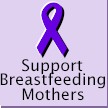[Who] [What] [When] [Where] [Why]
|
|
|
Why Breast Feed?Human milk is the food that is produced especially for the needs of human babies. Because the nutritional needs of calves are different from the nutritional needs of human infants, cow's milk contains different proportions of fat, proteins, water and sugars.According to Ruth A. Lawrence, Professor of pediatrics and Professor of Obstetrics and Gynecology at the University of Rochester, New York, among the mammals, only newborn marsupials are less developed than human newborns. We feed our babies milk designed for calves, but baby cows are born with their nervous and muscular systems so well-developed that they can walk soon after birth. Human babies' muscles and nervous systems must develop for around a year before baby's body can take a single step. Formula manufacturers add nutrients to cow's milk and soy formulas. They would like to reproduce the nutrients found in human milk, but some constituents of human milk haven't been even been discovered and isolated yet. Formula manufacturers will be trying to catch up to human breast milk for some time to come.
ColostrumEvery mother, whether she plans to continue breast feeding or not, should pass along antibodies and extra nutrition to her baby through her colostrum. In 1993, 55.9 per cent of American mothers who gave birth in hospitals breast fed at least during the time that they were in the hospital. The numbers are encouraging, but still, they mean that over 40 per cent of newborns born in hospitals aren't receiving the antibodies and extra nutrition of colostrum.
Antibodies and Breast MilkBut aren't breastfed babies are exposed to the same bacteria that the formula-fed infants are exposed to? Of course they are. Breastfed babies are healthier because their mothers' milk contains cells called microphages that attack and kill bacteria, fungi and viruses. Human milk also contains antibodies that fight against diseases that are present in the environment. Infants who drink breast milk have the extra protection of the antibodies that their mothers' immune systems have produced. Formula contains no such antibodies. When a formula-fed infant is exposed to a bacteria, virus or fungus, its immature immune system must fight against infection on its own.
Differences between Human and bovine milk
Deficiencies in formula-fed babiesThere have been several studies documenting the fact that breast-fed children are healthier, as a group, than breast fed babies. Some babies are allergic to cow's milk. Their parents have to try different formulas, each one more expensive and each one more artificial, in order to find one that their baby can tolerate. No babies are allergic to their mothers' milk.
Babies who should not be breast fedBabies whose mothers are HIV positive shouldn't be fed their mothers milk, because their milk can contain the HIV virus. Babies of mothers with AIDS can benefit from donated milk from a milk bank. |

Visitors since December 15, 1999